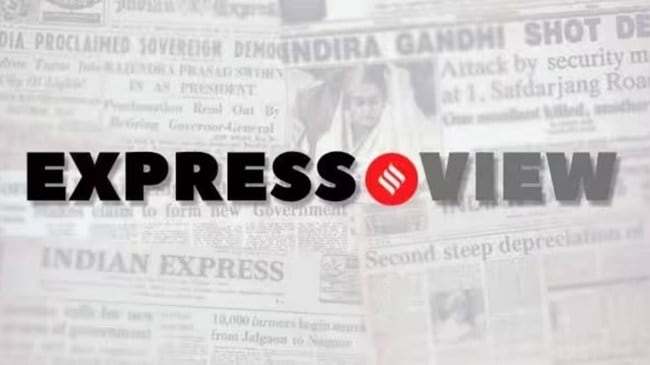Opinion Express View on denial of bail to Umar Khalid and others in Delhi riots case: An injustice
Five years on, the Delhi HC's refusal to make vital distinctions — between constitutionally protected freedoms, which include the freedom to dissent, and a direct incitement to violence — is extremely disturbing
 The highest court must live up to such words and prevent the miscarriage of justice in the Delhi riots case.
The highest court must live up to such words and prevent the miscarriage of justice in the Delhi riots case. In a ruling that raises serious concerns about due process, and the disturbingly low bar for evidence, and for the standards by which it should be proven in a court of law to justify the prolonged incarceration of individuals, the Delhi High Court has declined bail to Umar Khalid and nine others in the Delhi riots case, more than five years after arrest. The 133-page ruling is a blow to the liberty of the individuals who have been loosely accused of “conspiracy”. It is also a moment to pause and ask fundamental questions — about what constitutes a “terrorist act”, what is the threshold of evidence necessary for the state to label someone a terrorist, and the rigour of the court’s scrutiny of the prosecution’s inferences and claims. The ruling, which announces at the outset that it would confine itself only to a “surface analysis of the evidence”, goes on to give the prosecution the benefit of every doubt, disregards the apparently flimsy nature of its evidence, and shows little or no sensitivity to the grave consequences of denying bail to the accused, without trial, years after incarceration.
The prosecution has argued that the accused conspired to organise “chakka jams”, or road blockades, with the intention of “striking terror” in the national capital. Yet much of the so-called evidence rests on WhatsApp chats, and the testimony of “protected witnesses,” who were present in “secret” meetings and whose statements cannot be tested through cross-examination. Consider, for instance, the account of a protected witness codenamed Pluto, who testified that while delivering biryani to the accused in a North-East Delhi basement, he overheard plans to “burn Delhi using firearms, petrol, and other means and funds had already been arranged for the said purpose.” There are other witnesses who testify that the accused, Sharjeel Imam, told a crowd that the government is anti-Muslim, or that the Citizenship Amendment Act “targets only Muslims.” In the case of Gulfisha, an activist, the court treats her act of creating WhatsApp groups to organise women at protest sites as a conspiratorial assault on the state itself. The court’s refusal to make vital distinctions — between constitutionally protected freedoms, which include the freedom to dissent, and a direct incitement to violence — is extremely disturbing. Instead of interrogating whether any of the accused explicitly incited the riots — a clear standard set by the Supreme Court in past rulings — it accepts the state’s theory of a shadowy conspiracy as sufficient grounds to continue their detention under the stringent Unlawful Activities (Prevention) Act. “If you’re doing something against the nation, you better be in jail till you are acquitted or convicted” — Solicitor General Tushar Mehta’s statement flies in the face of the constitutional guarantee of due process. The court’s abdication lets it stand unchallenged.
Over the last three years, this batch of bail pleas has travelled from one bench to the other in the Delhi High Court. The court does not hold itself accountable for this delay. Instead, it derides the petitioner’s plea to consider it as grounds for granting bail: “A hurried trial would also be detrimental to the rights of both the Appellants and the State”. The Supreme Court always underlines that bail is the rule and jail the exception. A former Chief Justice of India said, proudly, that he granted bail from “A to Z”. The highest court must live up to such words and prevent the miscarriage of justice in the Delhi riots case.




